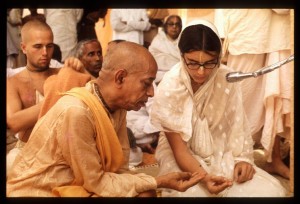With the blessings of our Bhakti-Vaibhava teacher, HG Radha Krsna Prabhu from Houston, I started sequential Srimad Bhagavatam study with other devotees here in Seattle. We meet weekly once to read and discuss a section of verses from Srimad Bhagavatam. To go deeper in my study and in preparation for the class, I started reading Srila Prabhupada’s purports scrutinizingly, in addition to His lectures wherever applicable and started taking notes on them. Along with the notes, I’ve listed appropriate examples / discussion points which help enhance the understanding of Srila Prabhupada’s purports along with bringing forth key points for practical application in our devotional lives. In a nutshell, I plan to share my Srimad Bhagavatam notes along with the audio recordings on this site for the following purposes:
- To save and organize my notes with links to entire stories elsewhere on the site for my own future reference.
- For use of reference material by the devotees in the study group during the class and later.
- To serve all other devotees who may embark on studying Srimad Bhagavatam deeply.
NOTES COLLECTION
SB 1.2.8-10: Need of the spirit soul
SB 1.2.8: The occupational activities a man performs according to his own position are only so much useless labor if they do not provoke attraction for the message of the Personality of Godhead
The need of the spirit soul is that he wants to get out of the limited sphere of material bondage and fulfill his desire for complete freedom. He wants to get out of the covered walls of the greater universe. He wants to see the free light and the spirit. That complete freedom is achieved when he meets the complete spirit, the Personality of Godhead. There is a dormant affection for God within everyone; spiritual existence is manifested through the gross body and mind in the form of perverted affection for gross and subtle matter.
SB 1.2.6-7: Complete satisfaction
SB 1.2.6: The supreme occupation [dharma] for all humanity is that by which men can attain to loving devotional service unto the transcendent Lord. Such devotional service must be unmotivated and uninterrupted to completely satisfy the self.

A living being’s sustenance of existence is to coordinate his activities with his eternal relation with the Supreme Lord Kṛṣṇa. Kṛṣṇa is the central pivot of living beings, and He is the all-attractive living entity or eternal form amongst all other living beings or eternal forms. Each and every living being has his eternal form in the spiritual existence, and Kṛṣṇa is the eternal attraction for all of them. Kṛṣṇa is the complete whole, and everything else is His part and parcel. The relation is one of the servant and the served. It is transcendental and is completely distinct from our experience in material existence.This relation of servant and the served is the most congenial form of intimacy. One can realize it as devotional service progresses. Everyone should engage himself in that transcendental loving service of the Lord, even in the present conditional state of material existence. That will gradually give one the clue to actual life and please him to complete satisfaction.
SB 1.2.1-5: Vaishnava is a true brahmana
SB 1.2.1: Ugraśravā [Sūta Gosvāmī], the son of Romaharṣaṇa, being fully satisfied by the perfect questions of the brāhmaṇas, thanked them and thus attempted to reply.
SB 1.2.2: Śrīla Sūta Gosvāmī said: Let me offer my respectful obeisances unto that great sage [Śukadeva Gosvāmī] who can enter the hearts of all. When he went away to take up the renounced order of life [sannyāsa], leaving home without undergoing reformation by the sacred thread or the ceremonies observed by the higher castes, his father, Vyāsadeva, fearing separation from him, cried out, “O my son!” Indeed, only the trees, which were absorbed in the same feelings of separation, echoed in response to the begrieved father.
SB 1.1.20–23: Hearing as a sacrifice
SB 1.1.20: Lord Śrī Kṛṣṇa, the Personality of Godhead, along with Balarāma, played like a human being, and so masked He performed many superhuman acts.
The Lord exhibited His divinity even from the lap of His mother, that His deeds are all superhuman (He lifted Govardhana Hill at the age of seven), and that all these acts definitely prove Him to be actually the Supreme Personality of Godhead. Yet, due to His mystic covering, He was always accepted as an ordinary human child by His so-called father and mother and other relatives. Whenever some herculean task was performed by Him, the father and mother took it otherwise. And they remained satisfied with unflinching parental love for their son. As such, the sages of Naimiṣāraṇya describe Him as apparently resembling a human being, but actually He is the supreme almighty Personality of Godhead.
SB 1.1.17-19: Developing taste
SB 1.1.17: His transcendental acts are magnificent and gracious, and great learned sages like Nārada sing of them. Please, therefore, speak to us, who are eager to hear, about the adventures He performs in His various incarnations.
Those who are not conversant with the activities of the Lord and His transcendental realm are sometimes favored by the Lord in His adventures as incarnations wherein He displays the eternal bliss of His association in the transcendental realm. By such activities He attracts the conditioned souls of the material world. Some of these conditioned souls are engaged in the false enjoyment of material senses and others in simply negating their real life in the spiritual world. These less intelligent persons are known as karmīs, or fruitive workers, and jñānīs, or dry mental speculators. But above these two classes of men is the transcendentalist known as sātvata, or the devotee, who is busy neither with rampant material activity nor with material speculation. He is engaged in the positive service of the Lord, and thereby he derives the highest spiritual benefit unknown to the karmīs and jñānīs.
SB 1.1.12–16: Partial to devotees
SB 1.1.12: All blessings upon you, O Sūta Gosvāmī. You know for what purpose the Personality of Godhead appeared in the womb of Devakī as the son of Vasudeva.
Bhagavān means the almighty God who is the controller of all opulence, power, fame, beauty, knowledge and renunciation. He is the protector of His pure devotees. Although God is equally disposed to everyone, He is especially inclined to His devotees. Sat means the Absolute Truth. And persons who are servitors of the Absolute Truth are called sātvatas. And the Personality of Godhead who protects such pure devotees is known as the protector of the sātvatas. Bhadraṁ te, or “blessings upon you,” indicates the sages’ anxiety to know the Absolute Truth from the speaker. Lord Śrī Kṛṣṇa, the Supreme Personality of Godhead, appeared to Devakī, the wife of Vasudeva. Vasudeva is the symbol of the transcendental position wherein the appearance of the Supreme Lord takes place.



